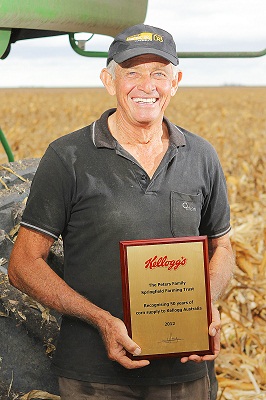News Releases
Aussie kids prove the adults wrong – 96 per cent know exactly where their food comes from
May 9, 2013
 |
Australian children have debunked the commonly held perception they are unaware of where their food comes from, with 96 per cent showing an excellent understanding of agriculture and the role Australian farming plays in the food chain.
Recent studies had suggested Aussie kids were left clueless when asked where simple foods like vegetables, grains and fruits originate but that couldn’t be further from the truth according to the latest research by Kellogg’s.
Yet despite understanding the theory, most kids never get the chance to experience a real working farm with the school field trip seemingly a thing of the past. Almost two thirds of Aussie kids confirmed they’d never had the opportunity to visit a farm with their school class.
Kellogg’s, which uses 100 per cent Australian grown grains for all of its cereals made in Australia, has a long association with Australian farmers, with several farming families supplying grains such as corn, rice and wheat to the company for more than 50 years. With 53 per cent or 409,673,000 hectares of Australia’s land used for agriculture and the industry contributing 3 per cent to the country’s gross domestic product, Kellogg’s believes more Aussie kids should be given the opportunity to experience life on the land.
In partnership with parenting website Kidspot, Kellogg’s is offering one lucky Australian school class the ultimate field trip with a visit to a real working wheat farm. Kellogg’s believes the trip will help kids reconnect with the land and hope it will inspire a new generation of kids to support the farming industry.
Primary school education expert, Dr Debra Bateman, who is an Associate Professor with the School of Education at Deakin University said this was a wonderful opportunity and initiative for the classroom of children who are successful, and the community of whom they will visit.
“The most effective education offers children experiences of learning in the world, about the world, and for the world. Opportunities, such as this one, enable students to learn more about themselves and their interests through their understandings of others Learning in this way assists students to develop understandings and knowledge about different ways of living, and potentially exposes them to previously unconsidered futures for their own lives,” Dr Bateman said.
The benefits extend the classroom too:
“Not only do these hands-on experiences assist children to more fully empathise and connect to things the see in their everyday lives, but will hopefully also become more critical consumers, as well as seeing first-hand the importance of our farming communities in feeding Australia,” Dr Bateman added.
The winning school will be invited to document their visit to one of the Kellogg’s farms so that the experience can be shared with kids across the nation. To participate, students, parents and teachers are invited to visit www.kidspot.com.au/seedtospoon and tell Kellogg’s and Kidspot in 50 words or less why their school class deserves to go on the ultimate field trip and visit one of Kellogg’s farming families.
Survey snapshot:
- Less than half (43 per cent) have visited a farm with their class. The result is similar across city and regionally-based children – 44 per cent versus 41 per cent respectively.
- 97 per cent know that wheat is a grain/plant and the same percentage identified that it came from a farm.
- More children in regional areas (84 per cent) have met a farmer in comparison to 66 per cent from cities.
To enter ‘Seed to Spoon’ visit www.kidspot.com.au/seedtospoon and follow the entry prompts.
The competition will be launched on 6 May 2013 and is open until 17 June 2013.
-ENDS-